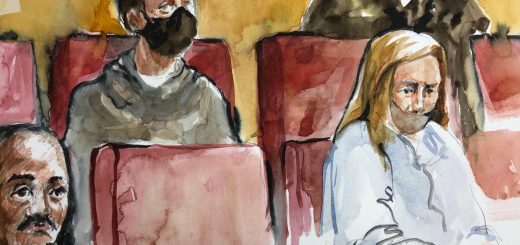No Good Deed: The Good Samaritan Drug Overdose Act Reaches the SCC

On February 22, 2024, the Supreme Court of Canada (“SCC”, or the “Court”) granted the Crown’s application for leave to appeal [40990] R v Wilson, 2023 SKCA 106 [Wilson]. The SCC’s decision will set a national standard regarding the limits of police powers to arrest and search a person who reports or remains at the scene of a drug overdose.
Background
The Good Samaritan Drug Overdose Act
On May 4, 2017, the Good Samaritan Drug Overdose Act, SC 2017, c 4 [Good Samaritan Act] became law across Canada. The legislation amended the Controlled Drugs and Substances Act, SC 1996, c 19 [CDSA] to provide certain protections for those who seek emergency assistance during a drug overdose. In passing the Good Samaritan Act, Parliament sought to encourage individuals who witness an overdose to seek emergency assistance without fearing legal repercussions. Among those protections, s. 4.1(2) of the CDSA now provides immunity from charges or conviction for simple possession:
4.1(2) No person who seeks emergency medical or law enforcement assistance because that person, or another person, is suffering from a medical emergency is to be charged or convicted of an offence under subsection 4(1) [i.e. simple possession of a controlled substance] if the evidence in support of that offence was obtained or discovered as a result of that person having sought assistance or having remained at the scene.
No Good Deed
On the morning of September 10, 2020, Paul Wilson was driving with a group of friends in rural Saskatchewan when a woman in the truck slipped unconscious. The group had been doing drugs together, and the unconscious woman, Cheryl Delorme, had just overdosed on fentanyl. One member of the group called 911, and the RCMP were dispatched to the scene along with medical personnel.
As first responders attended to Ms. Delorme, RCMP Constable Heidi Jo Marshall detected an odour of marijuana coming from the truck and observed a bag of what appeared to be crystal meth on the ground near the driver’s side door. Cst. Marshall proceeded to detain the rest of the group, providing each with their right to counsel and a police caution. Cst. Marshall then observed a white substance streaked near Mr. Wilson’s foot which she believed to be crystal meth. Although Wilson denied the white substance was his, he removed a black case from his pocket containing syringes and other drug paraphernalia. Cst. Marshall subsequently arrested each member of the group, including Ms. Delorme, for simple possession of a controlled substance under s. 4(1) of the CDSA.
The RCMP conducted a search incident to arrest of the truck and its contents. Inside one bag, officers discovered handguns, ammunition, and firearm parts. Inside other bags, officers located scales, baggies, and syringes. All except Ms. Delorme, who was on her way to the hospital to receive life-saving treatment, were re-arrested for various drug trafficking and firearms offences. Wilson subsequently told police that one backpack and the firearms in it were his. Wilson would eventually be charged with several offences under the Criminal Code, RSC 1985, c C-46 [Criminal Code], the most serious of which involved the firearms he admitted belonged to him. Wilson would never be charged with simple possession under s. 4(1) of the CDSA.
Procedural History
Saskatchewan Provincial Court
At trial, Wilson sought to exclude the firearms evidence under s. 24(2) of the Canadian Charter of Rights and Freedoms (“Charter”). Wilson took the position that police had breached his rights under ss. 8 and 9 of the Charter by arresting him for simple possession when the exemption provided in s. 4.1(2) of the CDSA meant he could not be charged with that offence. Consequently, the arrest and the search which followed were unlawful. In response, the Crown took the position that s. 4.1(2) was not engaged insofar as Wilson was never charged with simple possession, arguing that the exemption does not prevent police from conducting an arrest.
The trial judge agreed with the Crown that Wilson’s Charter rights had not been violated and admitted both the firearms evidence and Wilson’s subsequent inculpatory statement to police. Wilson was convicted of several firearms offences and received an eight-year sentence.
Court of Appeal for Saskatchewan
Wilson appealed his convictions to the Court of Appeal for Saskatchewan (“SKCA”), renewing each of his Charter arguments. Writing for an unanimous panel, Leurer J.A. (as he then was) held that the police had breached Wilson’s rights under ss. 8 and 9 of the Charter, and that admitting the firearms evidence would bring the administration of justice into disrepute. The SKCA excluded the evidence under s. 24(2) and entered acquittals on all counts.
Firstly, Leurer J.A. held that Wilson’s arrest for simple possession was unlawful. In his view, there was nothing on the record to indicate that the police were arresting Wilson for any purpose other than charging him with simple possession. Consequently, although legitimate purposes for arrest may emerge on other facts, they did not exist in the circumstances. Rather, as the police were barred from charging Wilson with simple possession by virtue of s. 4.1(2) of the CDSA, arresting him for that purpose was also unlawful. In turn, this meant that the search incident to arrest which discovered the firearms evidence was also prohibited, resulting in breaches of Wilson’s ss. 8 and 9 Charter rights.
Leurer J.A. proceeded to apply the test in R v Grant, 2009 SCC 32 [Grant], considering whether admitting the firearms evidence would bring the administration of justice into disrepute, having regard to:
- (1) the seriousness of the Charter‑infringing state conduct;
- (2) the impact of the breach on the Charter‑protected interests of the accused; and
- (3) society’s interest in adjudicating the case on its merits (Grant, para 71).
In Leurer J.A.’s view, the police misconduct in the circumstances was moderately serious. There was nothing on the record to indicate whether the officers arrested Mr. Wilson because they were unaware of the Good Samaritan Act, nor because they misunderstood its legal effect. Even so, police had ample time to determine whether Wilson could be lawfully charged with simple possession and consider whether arresting him could conceivably serve some otherwise lawful purpose. That the police did not consider these factors rendered their flawed decision to arrest more serious.
Further, the breaches became more serious when placed in a broader societal context. The Good Samaritan Act was passed to encourage individuals who witness or are present at an overdose to seek emergency assistance without fearing the legal consequences of drug possession. Accordingly, the breaches undermined this purpose by signalling to drug users that they cannot trust the Good Samaritan Act to protect them from arrest and the searches which may follow. In frustrating the purposes of legislation designed to save lives, the breaches became more serious than they might have otherwise been.
On the second Grant factor, Leurer J.A. held that the police misconduct had, at minimum, a moderately intrusive impact on Wilson’s Charter-protected interests. Although Wilson had no privacy interests in a truck that wasn’t his, the officers intruded upon the heightened privacy interests Wilson possessed in his personal backpack. Further, although Wilson’s unlawful arrest for simple possession was brief, this could not be a mitigating factor insofar as it was only made brief by virtue of the second arrest emerging from the unlawful search. Taken together, both the first and second Grant factors pointed moderately towards exclusion.
Consequently, the Grant analysis turned on whether these factors could outweigh society’s compelling interest in prosecuting gun crimes on their merits. In conducting the final balancing under s. 24(2), Leurer J.A. considered that this inquiry is focused on maintaining the long-term integrity of and public confidence in the administration of justice. Leurer J.A. emphasized that “it is likely that Ms. Delorme is alive only because one of her companions called 911” (Wilson, para 106). To send the message that such good deeds may be punished by the courts would undermine the purpose of the Good Samaritan Act and risk the lives of tomorrow’s overdose victims. In his view, this outcome would undermine long-term public confidence in the justice system. Accordingly, Leurer J.A. excluded the evidence and entered acquittals on all counts.
Strait is the Gateway
The Good Samaritan Act does not protect individuals from being charged with or convicted of any offence other than simple possession. Against this backdrop, the SCC will need to address the extent to which evidence of simple possession can provide police with a gateway to investigating and prosecuting non-exempt offences. The issue here is plain: drug users will be less likely to call in an overdose if they know that police can use evidence of drug use as leverage to invade their privacy in search of further, non-exempt criminal activity.
In Wilson, Leurer J.A. left open the possibility that there may be circumstances where police can lawfully arrest someone for simple possession even though they cannot be charged with that offence. If the SCC accepts this proposition, the Court must clearly circumscribe the police’s power to conduct a search incident to arrest in those situations. After all, this is the type of gateway investigation which threatens to undermine the Good Samaritan Act; where evidence of drug possession can lead to police uncovering evidence of non-exempt offences that would not have been discovered otherwise.
The purposes for which police may conduct a search incident to arrest were most recently canvassed by the SCC in R v Stairs, 2022 SCC 11 [Stairs]. These purposes include: (i) police and public safety; (ii) preventing the destruction of evidence; and (iii) discovering evidence that may be used at trial (Stairs, para 36). If the purpose of the search is to secure evidence, it is uncontroversial that such evidence must relate to the specific offence for which the accused has been arrested (R v Caslake, [1998] 1 SCR 51, para 22).
Accordingly, if an individual is arrested for simple possession after reporting or remaining at an overdose, police should not be permitted to rely on the need to discover or preserve evidence to justify a subsequent search. Plainly, that the evidence may be used at trial cannot be a valid justification when there can never be a trial for that specific offence. Consequently, the only conceivable purpose for a search incident to arrest could be ensuring police and public safety, akin to the limited power the common law provides police to conduct a search incident to investigative detention.
As in Stairs, this is a situation where the SCC ought to tighten the common law standard for a valid search incident to arrest. This outcome aligns with the Good Samaritan Act’s intent to protect, among other interests, the privacy of those who seek emergency assistance during an overdose. Further, such an approach clearly conveys to those present at the scene of an overdose that officers will only be permitted to search them in discrete, limited circumstances where there is no evidence of criminal activity beyond drug possession.
This clarity is critical insofar as ambiguity can only inhibit those who would rely on the Good Samaritan Act for protection. Wilson provides the SCC with the opportunity to set a national standard as to when police may curtail civil liberties at the scene of an overdose, and the precision of that standard will be just as important as the outcome of the appeal.







Join the conversation